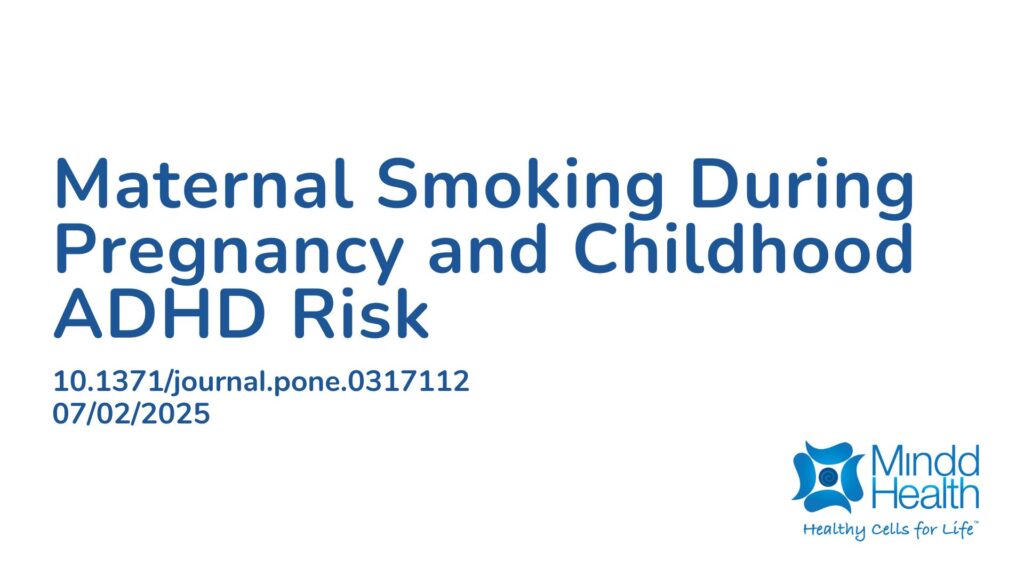Summary:
Maternal smoking during pregnancy remains a global public health concern, with harmful effects on fetal development. One area of growing interest is its possible link to attention-deficit/hyperactivity disorder (ADHD), a neuro-developmental condition characterised by inattention, hyperactivity, and impulsivity. Nicotine and other toxic substances in tobacco can cross the placenta and may interfere with brain development. Animal and cellular studies have shown that nicotine alters neurotransmitter systems and brain structures involved in attention and behavior. Some research also suggests that tobacco exposure may lead to changes in gene regulation through epigenetic mechanisms, which could increase the risk of ADHD. This systematic review and meta-analysis looked at the link between maternal smoking during pregnancy and ADHD, and included 55 studies with data from over 4 million participants. Results showed that maternal smoking was associated with a significantly higher risk of ADHD in children. These findings strengthen the case for integrating smoking cessation support into prenatal care to improve child neuro-developmental outcomes.
Abstract:
Introduction: Maternal tobacco smoking during pregnancy is a significant public health concern with potential long-lasting effects on child development. ADHD, a neurodevelopmental disorder characterized by inattention, hyperactivity, and impulsivity, may be influenced by prenatal nicotine exposure. This systematic review and meta-analysis examine the association between maternal tobacco smoking during pregnancy and the risk of ADHD in offspring. Methods: Following PRISMA guidelines, we searched databases including PubMed, Web of Science, Cochrane Central, Embase, Scopus, CINAHL, LILACS, SciELO, Allied and Complementary Medicine Database (AMED), ERIC, CNKI, HTA Database, Dialnet, EBSCO, LENS, and Google Scholar for studies up to November 1, 2024. We included peer-reviewed studies reporting quantitative effect size estimates for the association between maternal tobacco smoking and ADHD. Study quality was assessed using the Newcastle-Ottawa Scale (NOS). Results: We identified 2,981 articles and included 55 studies (4,016,522 participants) in the analysis. The meta-analysis showed a significant association between maternal tobacco smoking during pregnancy and increased risk of ADHD in offspring (pooled Odds Ratio (OR) = 1.71, 95% CI: 1.55-1.88; P < 0.001). Egger’s test indicated no publication bias (p = 0.204), but Begg’s test did (p = 0.042). By employing the trim and fill method, the revised OR was estimated to be 1.54 (95% CI: 1.40–1.70; P < 0.001). The OR were 2.37 (95% CI: 1.72–3.28; P < 0.001) in cross-sectional studies, 1.72 (95% CI: 1.49–2.00; P < 0.001) in case-control studies, and 1.53 (95% CI: 1.34–1.74; P < 0.001) in cohort studies. Meta-regression showed study design and study region significantly influenced heterogeneity (P < 0.10). Sensitivity and subgroup analyses confirmed the robustness of these findings. Conclusion: This systematic review and meta-analysis demonstrate a significant association between maternal tobacco smoking during pregnancy and increased odds of ADHD in offspring. These findings highlight the need for prenatal care guidelines and tobacco smoking cessation programs for pregnant women to reduce ADHD risk and promote optimal neurodevelopmental outcomes. Future research should explore underlying mechanisms and potential confounders further.
Article Publication Date: 07/02/2025
DOI: 10.1371/journal.pone.0317112



